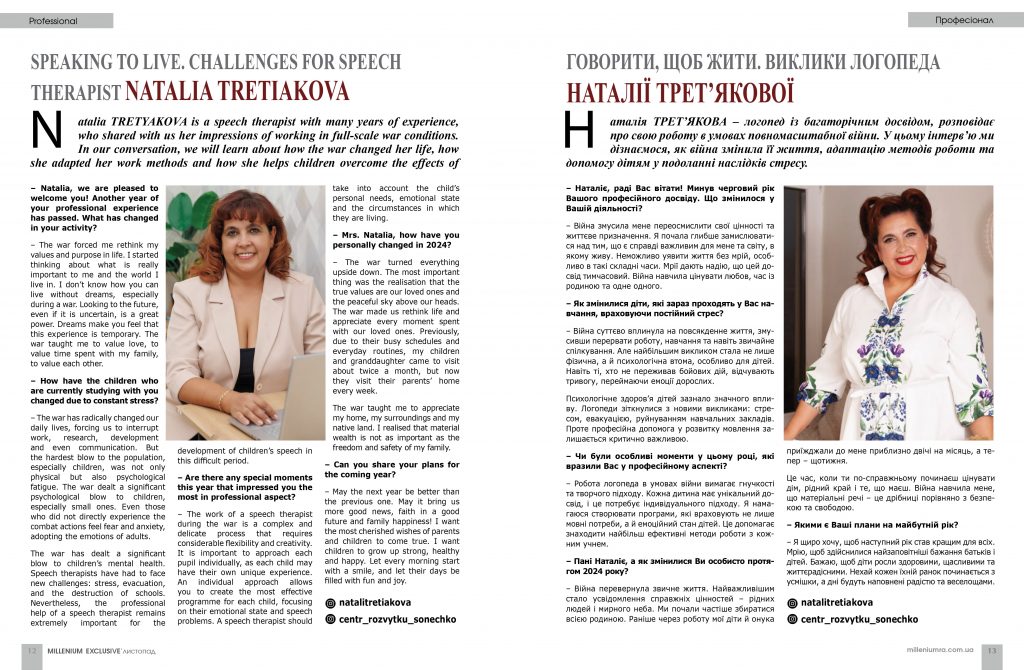Наталія ТРЕТ’ЯКОВА – логопед із багаторічним досвідом, розповідає про свою роботу в умовах повномасштабної війни. У цьому інтерв’ю ми дізнаємося, як війна змінила її життя, адаптацію методів роботи та допомогу дітям у подоланні наслідків стресу.

– Наталіє, раді Вас вітати! Минув черговий рік Вашого професійного досвіду. Що змінилося у Вашій діяльності?
– Війна змусила мене переосмислити свої цінності та життєве призначення. Я почала глибше замислюватися над тим, що є справді важливим для мене та світу, в якому живу. Неможливо уявити життя без мрій, особ-
ливо в такі складні часи. Мрії дають надію, що цей досвід тимчасовий. Війна навчила цінувати любов, час із родиною та одне одного.
– Як змінилися діти, які зараз проходять у Вас навчання, враховуючи постійний стрес?
– Війна суттєво вплинула на повсякденне життя, змусивши перервати роботу, навчання та навіть звичайне спілкування. Але найбільшим викликом стала не лише фізична, а й психологічна втома, особливо для дітей. Навіть ті, хто не переживав бойових дій, відчувають тривогу, переймаючи емоції дорослих.
Психологічне здоров’я дітей зазнало значного впливу. Логопеди зіткнулися з новими викликами: стресом, евакуацією, руйнуванням навчальних закладів. Проте професійна допомога у розвитку мовлення залишається критично важливою.
– Чи були особливі моменти у цьому році, які вразили Вас у професійному аспекті?
– Робота логопеда в умовах війни вимагає гнучкості та творчого підходу. Кожна дитина має унікальний досвід, і це потребує індивідуального підходу. Я намагаюся створювати програми, які враховують не лише мовні потреби, а й емоційний стан дітей. Це допомагає знаходити найбільш ефективні методи роботи з кожним учнем.
– Пані Наталіє, а як змінилися Ви особисто протягом 2024 року?
– Війна перевернула звичне життя. Найважливішим стало усвідомлення справжніх цінностей – рідних людей і мирного неба. Ми почали частіше збиратися всією родиною. Раніше через роботу мої діти й онука приїжджали до мене приблизно двічі на місяць, а тепер – щотижня.
Це час, коли ти по-справжньому починаєш цінувати дім, рідний край і те, що маєш. Війна навчила мене, що матеріальні речі – це дрібниці порівняно з безпекою та свободою.
– Якими є Ваші плани на майбутній рік?
– Я щиро хочу, щоб наступний рік став кращим для всіх. Мрію, щоб здійснилися найзаповітніші бажання батьків і дітей. Бажаю, щоб діти росли здоровими, щасливими та життєрадісними. Нехай кожен їхній ранок починається з усмішки, а дні будуть наповнені радістю та веселощами.
SPEAKING TO LIVE. CHALLENGES FOR SPEECH THERAPIST NATALIA TRETIAKOVA
– Natalia, we are pleased to welcome you! Another year of your professional experience has passed. What has changed in your activity?
– The war forced me rethink my values and purpose in life. I started thinking about what is really important to me and the world I live in. I don’t know how you can live without dreams, especially during a war. Looking to the future, even if it is uncertain, is a great power. Dreams make you feel that this experience is temporary. The war taught me to value love, to value time spent with my family, to value each other.
– How have the children who are currently studying with you changed due to constant stress?
– The war has radically changed our daily lives, forcing us to interrupt work, research, development and even communication. But the hardest blow to the population, especially children, was not only physical but also psychological fatigue. The war dealt a significant psychological blow to children, especially small ones. Even those who did not directly experience the combat actions feel fear and anxiety, adopting the emotions of adults.
The war has dealt a significant blow to children’s mental health. Speech therapists have had to face new challenges: stress, evacuation, and the destruction of schools. Nevertheless, the professional help of a speech therapist remains extremely important for the development of children’s speech in this difficult period.
– Are there any special moments this year that impressed you the most in professional aspect?
– The work of a speech therapist during the war is a complex and delicate process that requires considerable flexibility and creativity. It is important to approach each pupil individually, as each child may have their own unique experience. An individual approach allows you to create the most effective programme for each child, focusing on their emotional state and speech problems. A speech therapist should take into account the child’s personal needs, emotional state and the circumstances in which they are living.
– Mrs. Natalia, how have you personally changed in 2024?
– The war turned everything upside down. The most important thing was the realisation that the true values are our loved ones and the peaceful sky above our heads. The war made us rethink life and appreciate every moment spent with our loved ones. Previously, due to their busy schedules and everyday routines, my children and granddaughter came to visit about twice a month, but now they visit their parents’ home every week.
The war taught me to appreciate my home, my surroundings and my native land. I realised that material wealth is not as important as the freedom and safety of my family.
– Can you share your plans for the coming year?
– May the next year be better than the previous one. May it bring us more good news, faith in a good future and family happiness! I want the most cherished wishes of parents and children to come true. I want children to grow up strong, healthy and happy. Let every morning start with a smile, and let their days be filled with fun and joy.
